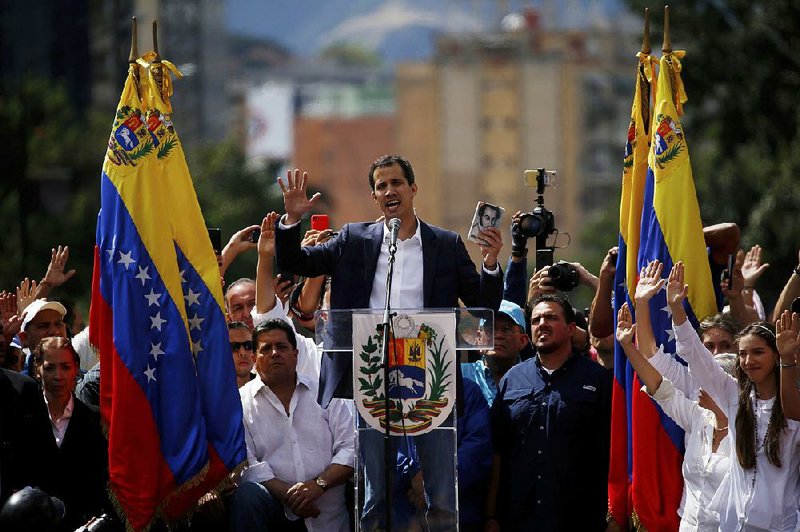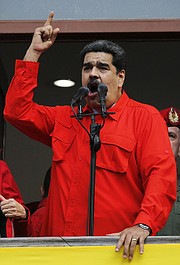CARACAS, Venezuela -- President Nicolas Maduro of Venezuela on Wednesday faced the gravest challenge to his authority, as the leader of the U.S.-backed opposition claimed the legitimate mantle of leadership.
President Donald Trump and other world leaders promptly recognized the opposition leader, Juan Guaido, as Venezuela's interim and rightful head of state.
A defiant Maduro, who assumed power in 2013, responded by announcing a break in "diplomatic and political relations" with the United States, ordering American diplomats to leave the country within 72 hours.
Guaido, head of the Venezuelan National Assembly and the opposition leader now recognized by Washington as Venezuela's interim ruler, called on any diplomats expelled by Maduro to remain. In a statement late Wednesday, U.S. Secretary of State Mike Pompeo suggested the Trump administration would not heed Maduro's demand and called on the Venezuelan armed forces to refrain from endangering American personnel or face "appropriate actions."
"The United States does not recognize the Maduro regime as the government of Venezuela," the statement said. "Accordingly the United States does not consider former president Nicolas Maduro to have the legal authority to break diplomatic relations with the United States or to declare our diplomats persona non grata."
Earlier in the day, Trump was asked whether military force was being considered. "We're not considering anything, but all options are on the table," he said. "All options, always, all options are on the table."
The developments came as anti-Maduro protests drew hundreds of thousands of people into Venezuelan streets in what the opposition called a sustained campaign to drive Maduro from office. After months of mounting U.S. sanctions against Venezuela, the move by the Trump administration to shift recognition to Guaido amounted to the strongest statement so far against what it called a "disastrous dictatorship." Yet the U.S. didn't outline its next concrete steps.
In a statement, Trump, whose hard stance on Venezuela has been championed by leading Florida Republicans, including Sen. Marco Rubio, called on other governments to follow the U.S. move.
"The people of Venezuela have courageously spoken out against Maduro and his regime and demanded freedom and the rule of law," Trump wrote. "I will continue to use the full weight of United States economic and diplomatic power to press for the restoration of Venezuelan democracy."
The move from Washington drew a strong rebuke from Maduro. He responded by swiftly cutting off diplomatic relations with the U.S., the biggest importer of the OPEC nation's oil.
"Before the people and nations of the world, and as constitutional president ... I've decided to break diplomatic and political relations with the imperialist U.S. government," Maduro said before a crowd of red-shirted supporters gathered at the presidential palace.
"Don't trust the gringos," he said. "They don't have friends or loyalties. They only have interests, guts and the ambition to take Venezuela's oil, gas and gold."
The escalating political showdown began Wednesday with Guaido's declaration to a crowd of supporters in downtown Caracas.
As demonstrators sang the national anthem, Guaido announced: "Today, Jan. 23, 2019, I swear to formally assume the powers of the national executive as president in charge of Venezuela."
He told Venezuelans to raise their right hands as he said: "Let's swear as brothers that we won't rest until we gain freedom."
The opposition, after years of division, has largely united behind Guaido. He called for the protests and has offered to lead a transitional government and hold new elections if Maduro steps down.
Maduro's claim to power is based on elections last year that were internationally condemned as a fraudulent power grab at a time when its people are suffering a humanitarian crisis. Mismanagement, corruption and failed socialist policies have broken the oil-producing nation, spreading hyperinflation, hunger and disease. The government has used repression, torture and exile to keep dissidents in line.
Though stripped of its power by Maduro, the National Assembly headed by Guaido is widely acknowledged internationally as Venezuela's last democratic institution. Even before Guaido's announcement, he had been recognized by Brazil and the head of the Organization of American States as Venezuela's rightful leader. On Wednesday, a list of other countries, including Colombia, Chile and Paraguay also recognized Guaido.
In recent days, Washington had already suggested its backing of Guaido, who activated charters in Venezuela's constitution to claim power in the event of a "usurper" in office.
In a video, U.S. Vice President Mike Pence on Tuesday called Maduro a "dictator with no legitimate claim to power" and backed the opposition protests as "a call for freedom." Coming on the heels of a series of U.S. sanctions, the move prompted Maduro late Tuesday to order a "revision" of diplomatic ties with the U.S.
PROTESTS SWELL
Amid sharply rising tensions between Washington and Caracas, Venezuelan opposition supporters Wednesday filled the streets with the largest anti-government protests since 2017, when hundreds of thousands sought Maduro's departure. That movement was crushed after official repression led to the deaths of more than 100 people.
Overnight, the smaller-scale protests that began Monday started to spread, with a throng of demonstrators in Bolivar state setting alight a statue of Hugo Chavez, the leftist firebrand who established Venezuela's socialist state and anointed Maduro as his successor before dying of cancer in 2013.
By Wednesday evening, seven demonstrators were reported killed amid disturbances in several cities.
At least 47 people have been detained since Monday, according to Foro Penal, a nonprofit legal firm that tracks and defends political prisoners.
As people started to gather on a rainy Caracas morning Wednesday, protests in some areas were being dispersed by security forces with tear gas. Nevertheless, crowds surged into the hundreds of thousands. In eastern Caracas, people yelled: "Who are we? Venezuela. What do we want? Freedom."
Gabriela Aristimuno, a 40-year-old lawyer, escaped tear gas in western Caracas and quickly joined the crowd in the east. "Fear? No, nothing. Freedom and my children are all I care about," she said. "I want everything I had before, before all this tragedy."
The official state television channel Wednesday showed images of pro-Maduro crowds and urged viewers to join a counterprotest. "The streets belong to Chavismo," the narrator said, referring to the government's left-wing ideology.
At the pro-government demonstration, people wore red caps and listened to Maduro and Chavez campaign songs. "Yesterday there was an insolent call by the United States. Today we have to go out to defend the revolution," said Guillermo Blanco, an employee of Venezuela's state oil company. "We don't take orders from anyone."
Backed by Russia, China and Cuba, Maduro has ordered the arrest, torture and exile of scores of opposition politicians. One day after Maduro's swearing-in, however, Guaido openly challenged his rule, saying he would be willing to become interim president if he won the support of the military, foreign powers and the people.
Guaido has sought to take a different approach than past opposition leaders, who have been accused of infighting and mismanagement. For instance, he has offered broad amnesty to the military for past repression and crimes if they turned on Maduro.
The military's loyalty remains key to Maduro's position. A U.S. intelligence official told The Washington Post this month that Maduro's defense minister, Vladimir Padrino Lopez, has privately told Maduro that he should step aside. And thousands of police, and military rank and file have deserted their posts. But outward signs of division within the military have been limited.
On Monday, dozens of Venezuelan National Guard personnel stole arms from two Caracas units, kidnapped four officials and recorded themselves in a northern slum urging people to join them in rebellion. The videos circulated on social media, but shortly afterward, the government announced the arrests of 27 dissenting officials.
That same day, hundreds of residents took to the streets as protests broke out in western slums across Caracas in the afternoon, continuing well past midnight.
On Tuesday night, spontaneous protests also started in more than 60 neighborhoods across the capital and in interior states. Many of the demonstrations were repressed by security forces with tear gas canisters and rubber bullets.
The demonstrations led some observers to suggest that the poorest sectors of the capital could join the opposition's traditional upper-class base in Wednesday's protests -- something that has rarely happened in the past.
"I'm tired," said Gladys Ibarra, a 40-year-old informal merchant who was protesting in a northwestern Caracas slum. "I'm tired of not having water, energy. Tired of waking up at dawn trying to find gas to cook."
Information for this article was contributed by Mariana Zuniga, Anthony Faiola, Carol Morello, Rachelle Krygier and John Hudson of The Washington Post; by Joshua Goodman, Scott Smith, Fabiola Sanchez, Jorge Rueda and Christine Armario of The Associated Press; and by Ana Vanessa Herrero of The New York Times.
A Section on 01/24/2019

